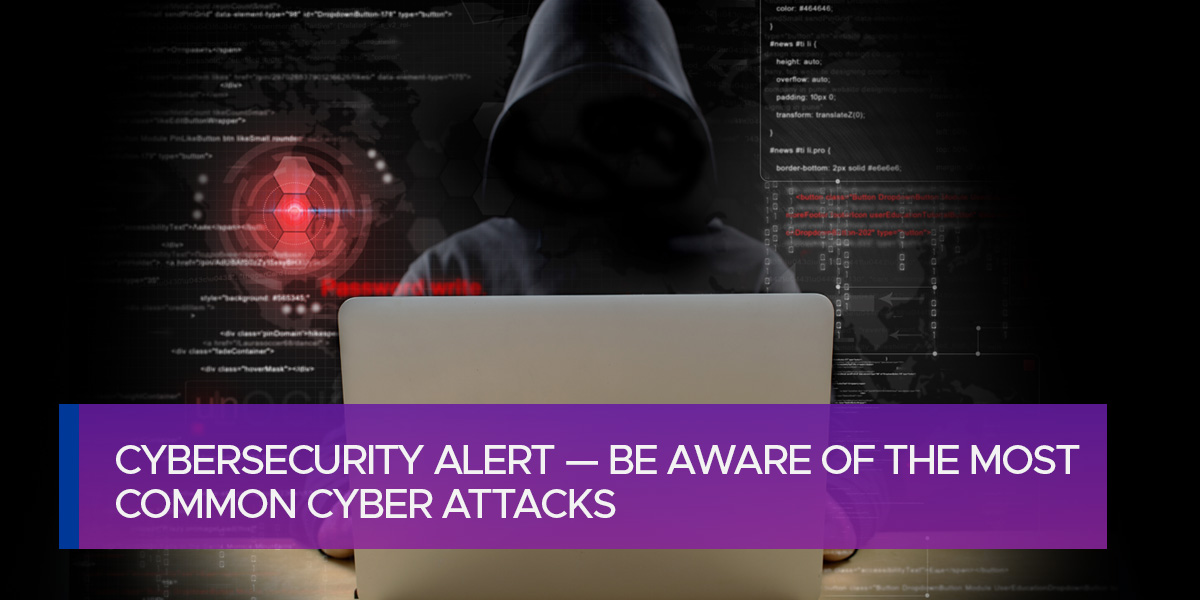
Cybersecurity Alert — Be Aware of the Most Common Cyber Attacks
Small and medium-sized business (SMB) owners often wear more than one hat when it comes to managing day-to-day operations and business processes. Many focus primarily on revenue and prioritize other tasks as they come up.
Unwittingly, they often end up overlooking cybersecurity, which leaves their organizations open to data theft or loss that could severely hamper their ability to do business.
In fact, 67% of small businesses have experienced a cyberattack, with more than half falling victim to data breaches.
Data breaches are often seen by consumers as the company’s failure to protect their sensitive information, so they often take their business elsewhere in the wake of a breach. This exodus of customers often causes the business to experience a loss of reputation from which it is hard to recover.
Hackers are smart — they understand that many smaller businesses don’t set aside the resources to safeguard their digital information, or that network security is often overlooked in the hustle and bustle of daily business.
They also understand that many employees are undereducated about online security protocols and best practices — and they take full advantage of their naivete to tease out critical information that will allow access to sensitive data.
Keeping your data safe begins with awareness and understanding how hackers can make inroads to your business’ crucial or sensitive data.
The 7 Most Common Cyber Attacks on Businesses Today
To help you gain understanding of the tools hackers use so you can better protect your digital assets, we’ve curated the top seven types of attacks businesses are experiencing in today’s increasingly dangerous online environment.
- Malware
One of the biggest threats online, malware is also one of the most common hacker tools. But what is malware?
Simply put, malware is a code that is created to compromise a computer system without the consent of the user. Malware includes software, ransomware, and spyware, among others.
Typically, malware is thought of as a “computer virus” and these attacks are on the increase.
- Phishing
Phishing takes advantage of gullible users when an attacker poses as a trusted site or individual and tricks the target into opening an email, text, or other communication. Then, the victim is enticed to open a malicious link or to reveal information that will provide access to crucial data.
- Password Attack
This is an attempt to get a user’s password or decrypt it in order to gain access to a system. Hackers use sophisticated cracking programs, algorithms, and password sniffers to decode various passwords.
The best defense? A password that uses unrecognizable words and is frequently changed.
- DDoS Attacks
DDoS stands for denial-of-service — which means the shutdown of your network.
Hackers manage this by flooding the targeted network with information or traffic until it crashes, denying users the resources they need.
- MITM
Man-in-the-middle (MITM) techniques let hackers intercept communication between two entities.
The goal is to intercept the key message and retransmit it with requests or information provided by the hacker, causing the recipient of the communication to trust the source, and respond by revealing critical information.
- Drive-by Downloads
In the past, you used to have to accept a download of software for it to reach your computer.
Now, just a simple “drive by” of a seemingly innocent, yet infected, website as you visit or click through could cause malicious software to download in the background of your device.
- Malvertising
Hackers often inject legitimate online ads with malware so the computers of users who click on the ads are infected with a virus.
Fortunately, by educating employees about cybersecurity and working with a managed network services provider skilled in cybersecurity protocols, you can protect your business from many of these threats.
Let the Experts at Virginia Business Systems Secure Your Network
The Virginia Business Systems team of network management experts has the kind of in-depth knowledge needed to ensure your business has the level of cybersecurity it needs to ward off today’s increasingly complex cyber threats.
Our professional IT services provide comprehensive cybersecurity protection across all devices for enhanced compliance with data protection regulations and superior defense against common vulnerabilities.
Protect your business’ reputation and finances against cyberattacks and other security threats with professional network management. Contact a Virginia Business Systems consultant today learn how we can keep your data — and your business — safe.
